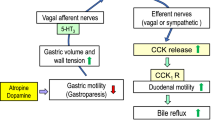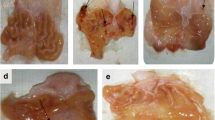Abstract
Cholecystokinin is a gastrointestinal hormone known to physiologically regulate pancreatic protein secretion and gallbladder contractility. Some evidence suggests that cholecystokinin is also involved in the maintenance of gastrointestinal mucosal integrity. This study was undertaken to ascertain whether cholecystokinin could prevent the gastric mucosal injury induced by acidified ethanol and what role prostaglandins, and type A and type B cholecystokinin receptors might play in this process. Conscious, fasted rats were given subcutaneous saline or cholecystokinin octapeptide (10–100 µg/kg) 30 min before a l-ml oral gastric bolus of acidified ethanol (150 mM HCl/50% ethanol). Five minutes later, rats were sacrificed and the total area of macroscopic injury quantitated (square millimeters). In additional experiments using a similar protocol, 1 ml of either the cyclooxygenase inhibitor, indomethacin (5 mg/kg), a type A cholecystokinin receptor antagonist, L-364,718 (0.01–1 mg/kg), or the type B cholecystokinin receptor antagonist, L-365,260 (12.5–25 mg/kg) was given intraperitoneally 30 min prior to pretreatment with cholecystokinin octapeptide. Cholecystokinin octapeptide dose-dependently prevented mucosal injury from acidified ethanol (corroborated by histology). The protective effect of cholecystokinin octapeptide was completely negated by L-364,718 and partially reversed by indomethacin, while L-365,260 had no discernible effect in this process. In a further study, cholecystokinin was unable to prevent the damaging effects of aspirin and the inhibition of endogenous prostaglandins. Thus, it appears that cholecystokinin is able to maintain mucosal integrity in the face of a damaging insult by activation of type A cholecystokinin receptors, an effect mediated, at least in part, through the release of endogenous prostaglandins.
Similar content being viewed by others
References
Walsh JH: Gastrointestinal hormones.In Physiology of the Gastrointestinal Tract, Vol I, 2nd ed. LR Johnson (ed). New York, Raven Press, 1987, pp 181–253
Ware LW: Effect of cholecystokinin and caerulein on gastric secretion in cats. Gastroenterology 60:560–565, 1971
Konturek JW, Konturek SJ, Domschke W: Role of cholecystokinin in the control of gastric acid secretion and gastrin release in dogs and healthy and duodenal ulcer subjects. Scand J Gastroenterol 28:657–660, 1993
Konturek SJ, Bilski J, Tasler T, Ciesckowski M: Role of cholecystokinin in the inhibition of gastric acid secretion in dogs. J Physiol (London) 451:477–489, 1992
Lloyd KCK, Raybould HE, Walsh JH: Cholecystokinin inhibits gastric acid secretion through type A cholecystokinin receptors and somatostatin in rats. Am J Physiol 263:G287-G292, 1992
Evangelista S, Maggi CA: Protection induced by cholecystokinin 8 in ethanol-induced gastric lesions is mediated by vagal capsaicin sensitive fibers and CCK-A receptors. Br J Pharmacol 102:119–122, 1991
Evangelista S, Maggi CA, Meli A: Influence of peripherally administered peptides on ethanol-induced gastric ulcers in the rat. Gen Pharmacol 18:647–649, 1987
Miller TA: Protective effects of prostaglandins against gastric mucosal damage: Current knowledge of proposed mechanisms. Am J Physiol 245:G601-G623, 1983
Whittle BJR, Vane JR: Prostanoids as regulators of gastrointestinal function.In Physiology of the Gastrointestinal Tract, Vol I, 2nd ed. LR Johnson (ed). New York, Raven Press, 1987, pp 143–180
Barreto JC, Smith GS, Russell DH, Miller TA: Gastric damage caused by acidified ethanol: Role of molecular HCl. Am J Physiol 265:G133-G137, 1993
Karnovsky MJ: A formaldehyde gluteraldehyde fixative of high osmolality for use in electron microscopy. J Cell Biol 27:137A-138A, 1965
Schmidt KL, Henagan JM, Smith GS, Hilburn PJ, Miller TA: Prostaglandin cytoprotection against ethanol-induced injury in the rat: A histologic and cytologic study. Gastroenterology 88:649–659, 1985
Wallace JL: Increased resistance of the rat gastric mucosa to hemorrhagic damage after exposure to an irritant: Role of the mucoid cap and prostaglandin synthesis. Gastroenterology 94:22–32, 1988
Ligumsky M, Golanska EM, Idansen DG, Kauffman GL: Aspirin can inhibit gastric mucosal cyclo-oxygenase without causing lesions in the rat. Gastroenterology 84:756–761, 1983
Guth PH, Aures D, Paulsen G: Topical aspirin plus HCl gastric lesions in the rat: Cytoprotective effect of prostaglandin, cimetidine, and probanthine. Gastroenterology 76:88–96, 1979
Carmichael HA, Nelson IM, Russell RI: Cimetidine and prostaglandin: Evidence for different modes of action on the rat gastric mucosa. Gastroenterology 74:1229–1232, 1978
Lee M, Aldred K, Lee E, Feldman M: Aspirin-induced acute gastric mucosal injury is a neutrophil-dependent process in rats. Am J Physiol 263:G920-G926, 1992
Henagan JM, Smith GS, Seidel ER, Miller TA: Influence of vagotomy on mucosal protection against alcohol-induced gastric damage in the rat. Gastroenterology 87:903–908, 1984
Pendley CE, Fitzpatrick LR, Ewing RW, Molino BF, Martin GE: The gastrin/cholecystokinin B receptor antagonist L-365,260 reduces basal acid secretion and prevents gastroin-testinal damage induced by aspirin, ethanol, and cysteamine in the rat. J Pharmacol Exp Ther 265:1348–1354, 1993
Robert A, Nezamis JR, Lancaster C, Hanchar AJ: Cytoprotection by prostaglandins in rats: Prevention of gastric necrosis produced by alcohol, HCl, NaOH, hypertonic NaCl, and thermal injury. Gastroenterology 77:433–443, 1979
Schmidt KL, Henagan JM, Mitchel PA, Smith GS, Miller TA: The protective effects of a prostaglandin without antisecretory properties against ethanol-induced injury in the rat stomach: A histologic study. Histol Histopathol 2:173–183, 1987
Chang RSL, Lotti BJ: Biochemical and pharmacological characterization of an extremely potent and selective non-peptide cholecystokinin antagonist. Proc Natl Acad Sci USA 83:4923–4926, 1986
Lotti VJ, Pendleton RG, Gould RJ, Hanson HM, Chang RSL, Clineschmidt BV:In vivo pharmacology of L-364,718, a new potent non-peptide peripheral cholecystokinin antagonist. J Pharmacol Exp Ther 241:103–109, 1986
Lotti VJ, Chang RSL: A new potent and selective non-peptide gastrin antagonist and brain cholecystokinin receptor (CCK-B) ligand: L-365,260. Eur J Pharmacol 162:273–280, 1989
Guth PH, Smith E: The effect of gastrointestinal hormones on the gastric microcirculation. Gastroenterology 71:435–438, 1976
Konturek SJ, Bilsky J, Tasler J, Laskiewicz J: Gut hormones and stimulation of gastroduodenal alkaline secretion in conscious dogs. Am J Physiol 248:G687-G691, 1985
Kauffman GL, Aures D, Grossman MI: Intravenous indomethacin and aspirin reduce basal gastric mucosal blood flow in dogs. Am J Physiol 238:G131-G134, 1980
Garner A, Flemstrom G, Heylings JR: Effects of anti-inflammatory agents and prostaglandins on acid and bicarbonate secretions in the amphibian isolated gastric mucosa. Gastroenterology 77:451–457, 1979
Author information
Authors and Affiliations
Additional information
This work was supported by research grant DK 25838 awarded to Dr. Miller from the National Institutes of Health.
Rights and permissions
About this article
Cite this article
Mercer, D.W., Cross, J.M., Barreto, J.C. et al. Cholecystokinin is a potent protective agent against alcohol-induced gastric injury in the rat. Digest Dis Sci 40, 651–660 (1995). https://doi.org/10.1007/BF02064386
Issue Date:
DOI: https://doi.org/10.1007/BF02064386




